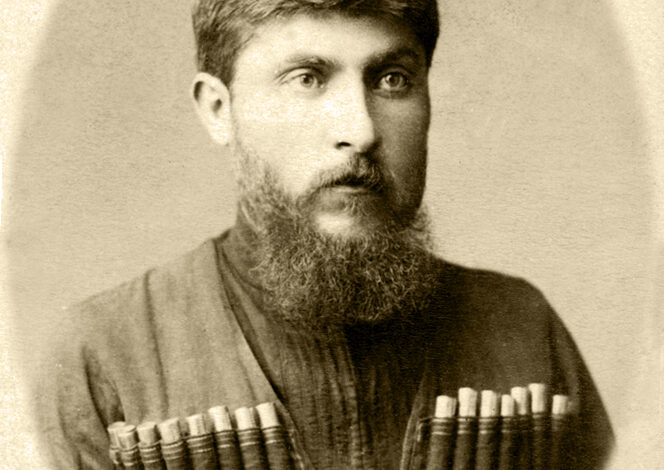
Vazha Pshavela – Biography
Vazha-Pshavela (July 26, 1861-July 10, 1915) is the pen-name of the Georgian poet and writer Luka P. Razikashvili, a classic of the new Georgian literature.
He was born in a small village Chargali (Pshavi mountainous province in Eastern Georgia) in a family of clergyman. He graduated from the Pedagogical Seminary in Gori 1882, where he became close to Georgian populists (narodniki). Then 1883 entered Law Department of St. Petersburg University (Russia) as a non-credit student, but returned to Georgia in 1884 due to financial restraints. worked as a teacher of Georgian language. He was also a famous representative of a National-Liberation movement of Georgia.
Vazha Pshavela started his literature activities in mid-1880s. In his works, he portrayed everyday life and psychology of his contemporary Pshavs. Vazha Pshavela is the author of many world-class literary works – 36 epics, about 400 poems (“Aluda Ketelauri”, “Bakhtrioni”, “Gogotur and Apshina”, “Host and Guest”, “Snake eater”, “Eteri”, “Mindia”, etc.), plays, and stories, as well as ethnographic, journalistic, and critic articles. He pictured the highlanders’ life almost exactly ethnographically and still recreated an entire world of mythological concepts. In his poetry, the poet addressed the heroic past of his people and appealed to the struggle against external and internal enemies (poems A Wounded Snow Leopard (1890), A Letter of a Pshav Soldier to His Mother (1915), etc.). In his best epic compositions, Vazha Pshavela exposed the problems of interaction between an individual and a society, a human and nature, love and duty before the nation. A conflict between an individual and a temi (community) is depicted in epics Aluda Ketelauri (1888, Russian translation 1939) and Guest and Host (1893, Russian translation 1935); its characters choose against some obsolete laws of their community. The poet’s preferences are strong-willed people, their dignity, and zeal for freedom. The same themes are touched in the play The Rejected One (1894). Vazha Pshavela idealized the Pshavs’ old rituals, their purity, and non-degeneracy with the “false civilization”. The wise man Mindia in the epic Snake-Eater (1901, Russian translation 1934) dies because he cannot reconcile his ideals with the needs of his family and society. The epic Bakhtrioni (1892, Russian translation 1943) narrates on participation of the Georgian highlander tribes in the uprising of Kakheti (East Georgia) against the Iranian subjugators in 1659.
As a nature admirer, Vazha Pshavela knows no comparison in Georgian poetry. His landscapes are full of motion and internal conflicts. The language is saturated with all the riches of his native language, and yet this is an impeccably exact literary language. Thanks to excellent translations into Russian (by N. Zabolotsky, V. Derzhavin, B. Pasternak, S. Spassky, and others), Vazha Pshavela’s compositions became available to representatives of other nationalities of the ex-USSR. Poems and narrative stories of Vazha-Pshavela have also been translated and published in more than 20 languages.
Vazha Pshavela died in Tiflis on July 10, 1915. Buried ibidem, in the Pantheon of the Mtatsminda Mountain.




